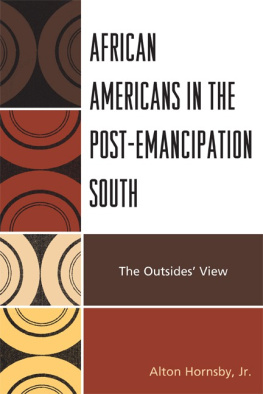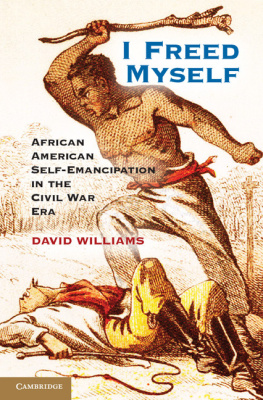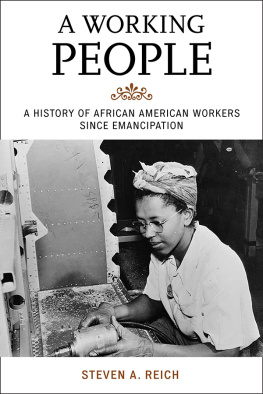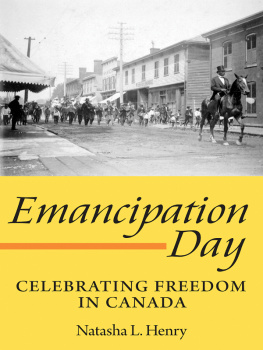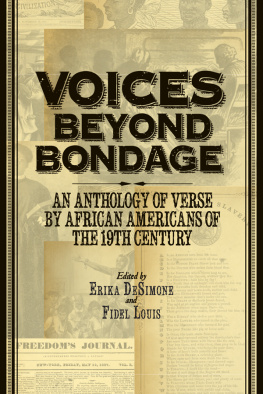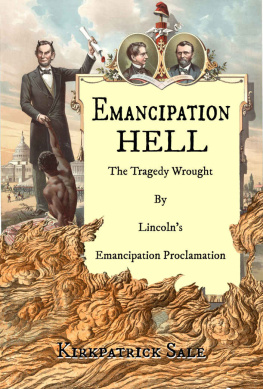Acknowledgments
Julie Saville, Tom Holt, Amy Dru Stanley, and Ken Warren helped me to shape what grew from an unfocused interest in medical care and African American history into a book manuscript. Julie Savilles questions helped me to connect this project with phenomena in the wider Atlantic world. Ken Warrens patience with a historian who wanted to write about fiction has been a consistent and comforting force. Amy Stanleys vigorous inquiries and insightful critiques have strengthened my scholarship. Tom Holt has been a model adviser. He took on this project and revealed a true interest in and knowledge of American medical history. Conversations and correspondence with him have helped me to see the need to rework my arguments and to see the value in opening up an interesting question even when the answer remains elusive. His own imaginative work on African American history and his sensitivity to nuance provided me and many others with a valuable framework in which to ground our own inquiries.
This project would have been impossible without the remarkable Freedmen and Southern Society Project at the University of Maryland. The tireless and careful work of the editors and staff there has resulted in the archive to which I turned time after time. Leslie Rowland, editor at the Project, scholar, and teacher, has been an exemplary mentor. She welcomed me to Maryland, answered my questions, pointed me toward (and away from) sources, read my work, and gave me practical feedback. I am in awe of the Freedmen and Southern Society Projects work and look forward to returning as I begin other scholarly endeavors.
I was lucky to have many friends and relatives in Chicago who pulled hard and encouraged me all along the way. They also helped me to revel in the richness of the nonacademic parts of my life. The health workers at the Chicago Womens Health Center first showed me the power that good medical practice can bestow on people who have been socially marginalized. I received immeasurable support from friends on the playground of the Murray Language Academy. I relied upon my family in Chicago, particularly Chris Long and Newton Ellison Long, to talk about the African American experience and to help me draw out the role of medical practice in African American history. Newton Long did not live to see the completion of this project, but the interest he showed in it and his ability to connect its questions to broader themes in American society were nourishing. Charles Long has encouraged and challenged me in my scholarly work. His impatience with my pace spurred me on to completion.
After a move to Williams College, I accumulated even more scholarly debts. A fellowship from the Newberry Library allowed me to return to Chicago for some weeks to research and write. The dean of the faculty at Williams and the Oakley Center there provided grants that released me from teaching duties at key moments. A generous fellowship from Harvards W. E. B. DuBois Center for African and African American Studies enabled me to continue my research at the center. I was fortunate to have Amber Moulton as a research assistant there. I am grateful to Henry Louis Gates for his presence as a lively interlocutor and to Susan Reverby for sisterly and scholarly support during that year and beyond. Pat Sullivan, whom I met at the DuBois, generously encouraged me to pursue publishing at the University of North Carolina Press. It would have been impossible for me to accept the DuBois fellowship without the incredible generosity and hospitality of Amy Null, Andrew Budson, and their children, Leah and Danny. They opened their home to me for many months. I am blessed to count them as friends.
Many friends and colleagues have read drafts of this work, provided comments, and kindly pointed out errors, making the work stronger. I am particularly grateful to Laurie Green, Quincy Mills, Adam Biggs, Tess Chakkalakal, Merida Rua, Guillaume Aubert, Peter Starenko, Todd Savitt, and Neville Hoad. I am grateful to Sharla Fett and Keith Wailoo, manuscript readers for the University of North Carolina Press, who took this work seriously and offered extraordinarily insightful suggestions for making it better. I also owe a debt to my colleagues in the history and Africana studies departments at Williams College as well as to Lori DuBois and Emery Shriver, reference librarians. Kenda Mutongi has been particularly generous, reading drafts and offering insights, challenges, and friendship in equal measure. Paul Park read the entire manuscript, and his honest critiques helped me find my way.
Joyce and John Rossitter have been a marvelous support, stepping forward when I needed to devote days and nights to research and writing. My brother, Nathan Kellar-Long, and his family have given me unwavering support and love. My own parents, Jerome and Patricia Long, have encouraged me in this project from the beginning. Their belief in the value of intellectual inquiry and their demonstrations of social responsibility have meant more to me than I can express. Patricia Long has served simultaneously as babysitter, copyeditor, and coconspirator extraordinaire, particularly over the last year when my full-time teaching duties, mothering, and writing threatened to overwhelm. I could not have reached this point without her. My paternal grandparents, Diamond Geneva Long and Samuel Preston Long, died before I was born. They and their parents lived through some of the period that this book covers. Had they had access to better medical care and social justice, I might have been able to know them.
My husband, David, has provided the finest example of true intellectual curiosity. His challenges to the basic tenets of my research projects have strengthened them immeasurably. This pales, however, next to his affection. My children, Thalia, Jacob, and Leo, have lived and grown alongside this project. Their good cheer and engagement with the world around inspires me.


